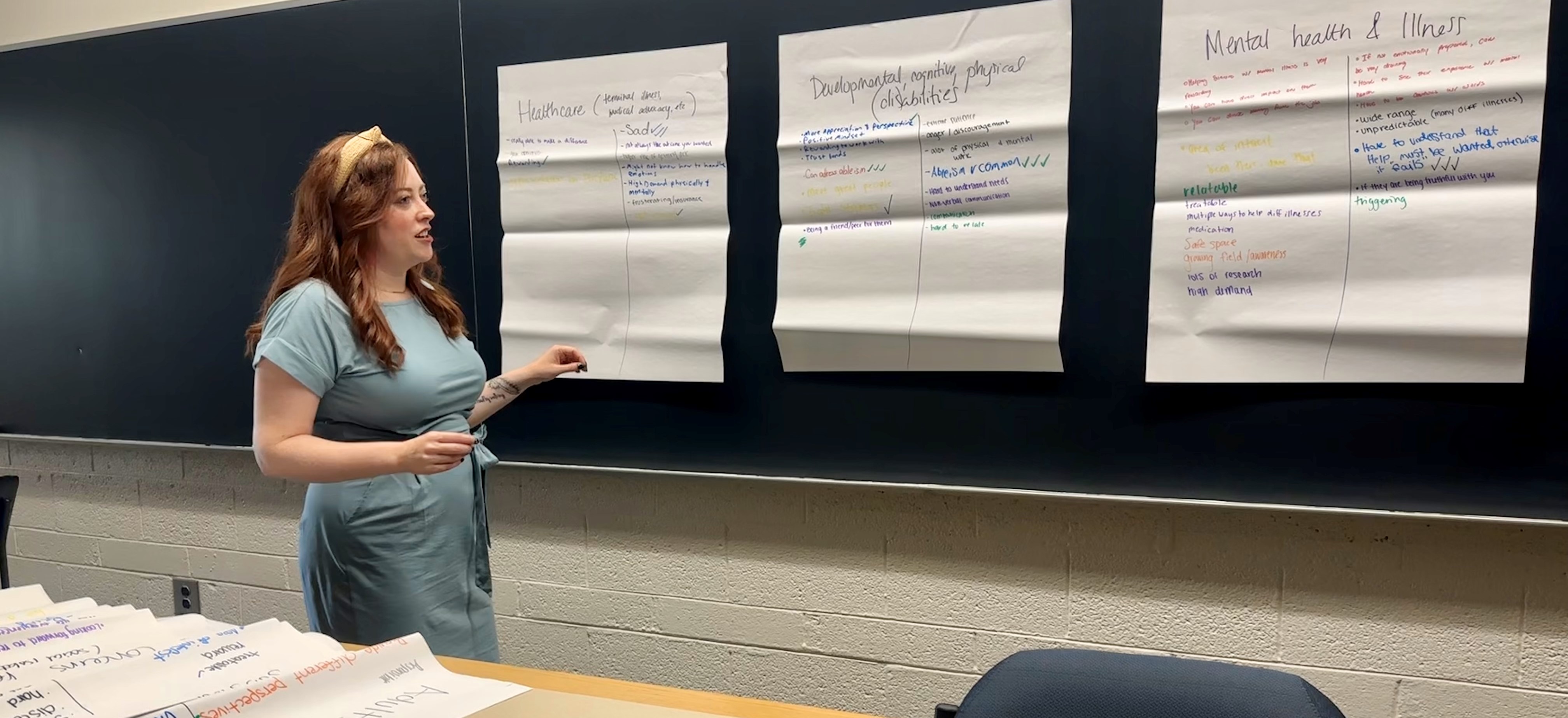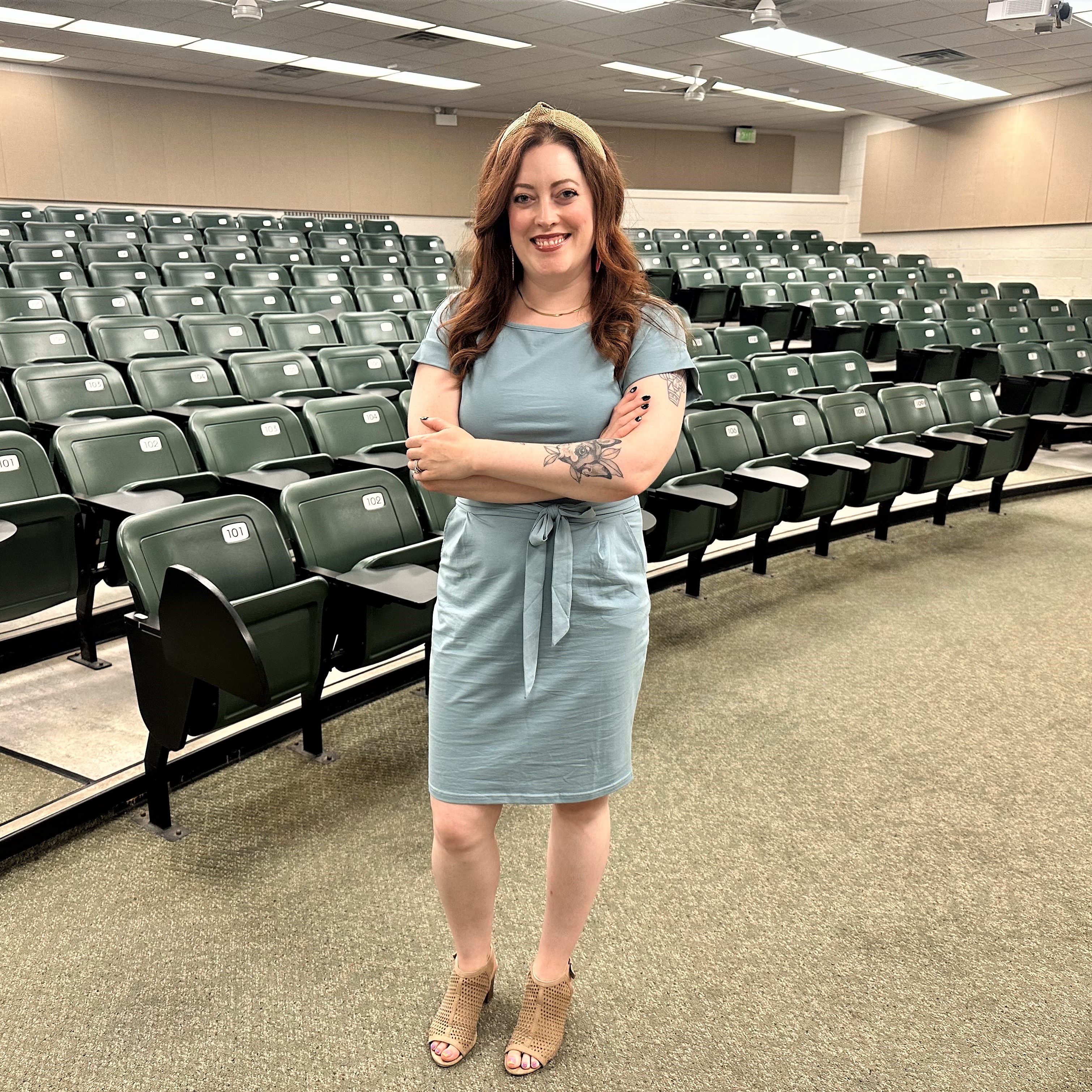Community Psychology is Key to Dr. Katie Clements’ Teaching
July 21, 2023 - Shelly DeJong

Dr. Katie Clements, assistant professor in the Department of Psychology, is a community psychologist whose journey has been marked by a deep commitment to community engagement and a belief in the transformative power of education. Through her research, teaching, and mentorship, Dr. Clements strives to empower individuals and communities, fostering thoughtful, engaged, and scholarly citizens who can effect positive social change.
Dr. Clements' path to community psychology began a few years after completing her undergraduate studies at the University of New Mexico. Dr. Clements reached out to her former psychology professor whom she admired and had been a part of her research team that worked closely with families in a local refugee community in a community-based mental health intervention.
“What I had liked so much about her research specifically was that it was community engaged,” said Dr. Clements. “Our research team was a blend of academics and community-based leaders in the refugee community. As an undergrad, I hadn’t been drawn to the clinical settings that you might think of when you hear psychology, but the community-based work was so fun.”
Her former professor introduced her to the field of community psychology. It was the first time that she learned that there is an entire field that trains people to do community-engaged scholarship.
Community Engagement and Research Focus
From refugees to unaccompanied minors seeking asylum, Dr. Clements has worked with communities to allow them to be active participants in the research process.
As an MSU graduate student in the Ecological-Community Psychology program, Dr. Clements’ work centered around immigration and refugee issues, addressing the unique challenges faced by these populations.
For her dissertation project, Dr. Clements collaborated with the Refugee Development Center in Lansing. As a volunteer in an after-school program at a local high school, Dr. Clements saw how aware the youth were about issues in their community, and how powerless they felt about them. With that in mind, she designed a participatory youth research program designed to teach teenagers to systematically study an issue important to them, analyze the data, and then take meaningful action.
Together, they discussed what topic they wanted to address, how to go about learning about it, how to design and collect survey data, and what to do with their results. By letting the youth lead every step of the research process, Dr. Clements instilled in them a sense of agency and the belief that they could effect change in their own communities. Through their collaborative efforts, the youth started a kindness campaign in their own school to help reshape social norms and combat bullying.
Dr. Clements’ dissertation evaluated how participating in this process developed critical consciousness in the youth.
Empowered Teaching 
As a professor, Dr. Clements’ passion for teaching shines through. In each class, she works to create a classroom environment where students actively participate and engage critically with real-world issues.
She knows that after leaving her classroom and graduating, her students won’t remember all the facts they needed to memorize. But she knows they will remember the ways her class helped them to see the world, their community, or even the news they read in a different way.
“We talk about a lot of news stories in class, and we ask what a psychologist could do about it. That’s what I want my students to get out of being a student in my class. It’s about the way it changes you in the world, not the things that you’ve memorized,” said Dr. Clements.
Dr. Clements’ teaching style fosters curiosity and encourages students to ask questions, empowering them to explore solutions and take steps toward addressing problems. She also encourages her students to acknowledge the personal biases that they have. By engaging in critical discussions as a class, she helps them understand the influence of their own perspectives on research and societal issues.
“My teaching style is less of talking to my students but rather having us apply these ideas together to different problems. That can be hard for students to get used to, but that’s how the process of changing your views of the world happens: by participating.”
Global Citizens
At the core of Dr. Clements' work lies the aim of nurturing thoughtful, curious, and scholarly citizens. She emphasizes the interconnectedness of individuals and communities.
“I think about the global community that we're all a part of and are building together. Those issues are our issues, and those needs are our needs,” said Dr. Clements. “That is how we build a community that is better. In my classes, I try to help students think about the global nature of being a citizen and what that means for the choices we make in the world.”
By instilling a sense of global citizenship, Dr. Clements inspires her students to become agents of change, equipped with the skills and knowledge to address the issues that they see around them.
“It’s impossible for me to think about teaching them as people who are not citizens in their community. I try and bring it back to that all the time,” said Dr. Clements. “We are all humans who see the world in a very specific way. If I can help you see that in a more thoughtful, inclusive way, that is all about making the world better, more just, that’s all I need to do. And I think that’s what Psychology can give them.”

